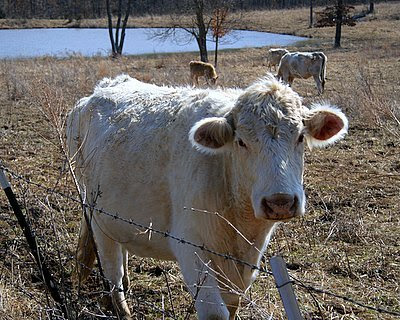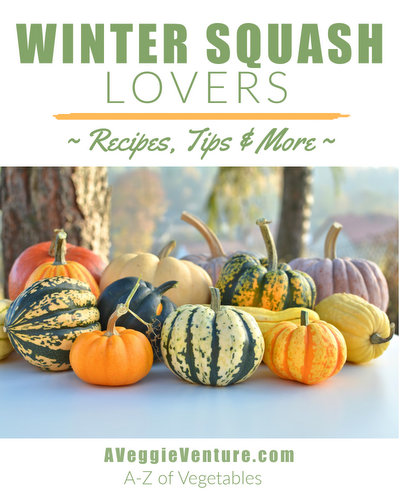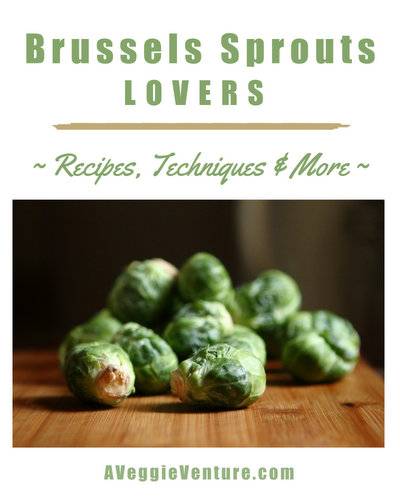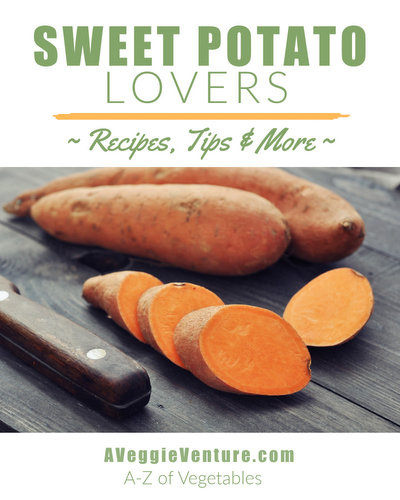Guest Post & Book Review: In Defense of Food by Michael Pollan
Today, a guest post from an A Veggie Venture reader who's just finished Michael Pollan's book 'In Defense of Food'. His essay is a lesson in the loss of connection to real food (in just one generation!) and ideas on what it takes to return.
I'd love to know your thoughts and invite you to join the conversation. ~AK
The butcher’s rack in my kitchen shelves my cookbooks. To use a poor albeit irresistible metaphor, it groans from the weight of undigested manuals on the art and craft of cooking. Of late, the central theme of the books has been shifting from cookbooks about food preparation to books about food itself. To this reader and (I can’t help myself) consumer of such books, the sources, chemical composition, care, preservation and delivery of food have become as important as the preparation and presentation of the final product.
 [Note to Vegetarians ~AK]
Mine is a farm background. Much of my childhood food came from within a radius of a hundred yards from where it was consumed: a milk cow, chickens, a large garden, wild game, freshly caught fish, beef and pork raised by nearby relatives.
Even so, it did not occur to me to draw a distinction between what I ate then compared to the same -- or claimed to be the same, since they are not the same at all -- stuff bought wrapped in paper, plastic and cardboard eaten throughout my adult years.
In fact, that real food served in my childhood home was always something of an embarrassment when my city cousins showed up. “I won’t drink cow’s milk,” we heard, just one disparagement of our fresh -- but in their minds uncivilized -- foods, uttered with noses in the air.
[Note to Vegetarians ~AK]
Mine is a farm background. Much of my childhood food came from within a radius of a hundred yards from where it was consumed: a milk cow, chickens, a large garden, wild game, freshly caught fish, beef and pork raised by nearby relatives.
Even so, it did not occur to me to draw a distinction between what I ate then compared to the same -- or claimed to be the same, since they are not the same at all -- stuff bought wrapped in paper, plastic and cardboard eaten throughout my adult years.
In fact, that real food served in my childhood home was always something of an embarrassment when my city cousins showed up. “I won’t drink cow’s milk,” we heard, just one disparagement of our fresh -- but in their minds uncivilized -- foods, uttered with noses in the air.
 Now comes the gradual realization that the home-grown foods of my childhood not only tasted better but also were better for us.
The latest epiphinal moment in my dietary evolution struck while reading Michael Pollan’s latest effort, In Defense of Food: An Eater's Manifesto
Now comes the gradual realization that the home-grown foods of my childhood not only tasted better but also were better for us.
The latest epiphinal moment in my dietary evolution struck while reading Michael Pollan’s latest effort, In Defense of Food: An Eater's Manifesto In the pantheon of good writing about food, Pollan stands out. No one gets to the ‘whatness’ of food better than Pollan. A professor of journalism at UC Berkeley, among other writing credentials, and the author of the acclaimed The Omnivore's Dilemma: A Natural History of Four Meals
In the pantheon of good writing about food, Pollan stands out. No one gets to the ‘whatness’ of food better than Pollan. A professor of journalism at UC Berkeley, among other writing credentials, and the author of the acclaimed The Omnivore's Dilemma: A Natural History of Four Meals Last fall I bought an elk from an elk ranch in Northern Missouri. Last month, the neighbor to my Ozark property sold me a grass-fed steer to butcher. These satisfied two of Pollan’s rules even before I read the book:
Last fall I bought an elk from an elk ranch in Northern Missouri. Last month, the neighbor to my Ozark property sold me a grass-fed steer to butcher. These satisfied two of Pollan’s rules even before I read the book:
Eat wild foods when you can.
Buy a freezer.
Another rule contains a wry humor mixed with common sense:
You are what you eat eats too.
Don't get your fuel from the same place your car does.
The rules address the broader scope of culture, suggesting a pleasurable and decent lifestyle:
Eat slowly.
Try not to eat alone.
And yes!
Have a glass of wine with dinner.
If one wishes to skip the book, Pollan himself summarizes it in seven words:
“Eat food. Not too much. Mostly plants.”
~JW
~ Unhappy Meals ~
Michael Pollan's 2007 essay, a good introduction to In Defense of Food
~ New Food Rules? ~
Michael Pollan's asked for the food rules we apply to our own lives, so far, more than 2500 contributions! I offered the eating idea first suggested in the recipe for Squash & Carrot Stew
~ More Food References & Food Issues ~
~ The Heartbeat of Iowa ~
my own return to a family farm in Iowa
And so dear readers, what do you think? Have Michael Pollan's books changed your thinking about food? Do you make different food buying decisions now versus a few years ago? How far have some of us come from our farm backgrounds -- and what would it take to return? Are you putting in a chicken coop?
Or -- are you growing tired of being told what to eat and where to buy your food? Are you overwhelmed by all the conflicting ideas and the time and energy it would take to change your food life?
Join the conversation -- I'd love to know what you're thinking! ~AK




great write up...im in the process of reading this book too :)
ReplyDeleteWe just did a bookclub cooking class at Kitchen Conservatory on In Defense of Food. One person thought it was the best book we had ever done. Others were not so enamored; they did not care for Pollan's preachiness or they felt he just rewrote Omnivore's Dilemma into a magazine article.
ReplyDeleteMy burning question after reading is why are leaves better than the rest of the plant? Pollan pushes the eating of leaves above everything else. Why are leaves better to eat than roots, stems, fruits, or seeds? Pollan is downright anti-seed, but I think that must stem from his animus toward the big four commodities (rice, corn, wheat, soy).
A book like Pollan's does not change any minds, but reinforces our existing prejudices against ingredients that we cannot pronounce.
nice blogs...
ReplyDeleteIt's good that you know tthat some of us are sick to death of hearing Buy organic this, Expensive local that. It's all I can do to pay bills and feed my family. I despise the blogs that preach their so-called values as if they know so much more.
ReplyDeleteA good read-generates more food for thought. I recently finished In Defense of Food. While I agree with much that Michael Pollan wrote, and appreciate the simple style backed with scientific data, I still don't know what to spread on my bread!
ReplyDeleteDo I buy a cardboard box of butter, and have the hard-to spread bad-for-my-heart yet more wholesome food in my diet? Or do I buy a plastic tub of organic cold-pressed vegan spread? Michael can't answer that, and neither can I. Still stumped.
I do like the reminder to read labels-since we ran out of all the spaghetti sauce I'd put up, and used up the last of the slow roasted tomatoes, we've had to purchase spaghetti sauce. Mark picked one based on the ingredient list and it's awesome-not a brand I'd ever seen before and incredibly tasty.
I bought a small freezer a few years ago, but I think next time we move I'll need to upgrade. I could fill the small freezer just with berries we pick over the summer! There's less room for veggies and meats on sale until we've eaten up all the stuff I put up in the summer/fall.
Actually, the thing that's gotten me to change my eating habits the most was joining a CSA (after Mark read Omnivore's Dilemma) and reading Animal Vegetable Miracle.
I switched from walking into the store with a list of items for specific meals, and switched to planning meals based on what I have.
After the first season of the CSA trying to react to all the new-to-me produce, I've now evolved into scanning the clearance/sale areas and picking up whatever is on sale (boneless pork loin 99 cents/lb today) and figuring out what to cook with it.
I like this new way better-I spend less at the grocery store and the whole family enjoys a wider variety in our diet.
fantastic! great advice.
ReplyDeletei love that conscious eating has made it into the mainstream.
This is such a huge issue in our house. My son has AS and sensory issues most closely related to food textures. Ever since he started on solid foods, food has been an issue. Add to that the fact that I have gained significant weight during this time that has started to affect my health.
ReplyDeleteJust recently, despite the barage of information out there, I realized that we eat hardly any real food. This is despite the fact that both of my grandparents had huge gardens and fruit trees and canned tons of fruits and veggies.
I am trying to alter our diet to include better quality foods, but I'm finding it just isn't that easy to do.
We are making another attempt at growing a few of the veggies I regularly eat in salads and am hoping that my sons has matured and is more open to trying things he has grown on his own.
We'll see....
I've never heard of this Michael Pollen guy but what he says makes a lot of sense to me. Thanks for giving me something new to think about today, it happens often with your recipes, it's why I subscribe. Thank you!!!
ReplyDeleteI've been headed the real food direction for years. Pollan's and other authors' writings do reinforce what I have found for myself: I feel better when I eat generally unprocessed foods. Although Pollan has a "manifesto," eating better doesn't have to be an all-or-nothing thing. You do what you can as time and money allows. Every step helps.
ReplyDeleteI've read In Defense of Food and enjoyed it, though it's a combination of two of his articles in the New York Times, Our National Eating Disorder and Unhappy Meals, expanded to fill a book. That's not necessarily a bad thing.
ReplyDeleteI think the most important thing Pollan says is to "Eat food. Don't eat something (someone's) great-grandmother wouldn't recognize as food." I don't think most of us realize how much of what is available to us isn't truly food.
In the Well blog entry where Pollan asks us for our food rules, a number of people have responded with some variation of "in theory, can I make this at home?" For example, in theory, we could make butter at home and we could make olive oil or peanut oil, and we could render lard, but we couldn't make canola oil, vegetable shortening, margarine or the various butter-like spreads. I can make cookies, but I can't make Oreos. I could make tortillas, even tortilla chips, but I couldn't make Doritos. I can make potato chips, but I can't make Pringles. I can make any number of cheese crackers, but I can't make Cheez-Its or Cheetos.
As I was thinking about what to write here, I realized that this is even more complicated than I thought. In theory, I could raise a cow and milk it. I could make any number of products from that milk -- butter, cheese and so on. But I couldn't pastuerize and homongenize the milk, and I couldn't make fat-reduced milk and cheeses.
For me, the next most important thing is to be skeptical of scientific research and studies. Though well-intentioned, they're often very misleading. Some that we've relied upon for decades may very well be wrong.
Anne -- I think leaves are pushed (not only by Pollan) because they're very nutrient dense. Kirsten -- I put butter on my bread.
I've also read Mark Bittman's Food Matters. I think it's quite practical and not as idealistic.
Sally
Its funny how such simple ways to lead a healthier life often go unnoticed. But I guess there are several ways to do it based on ones circumstances, but as long as the ultimate goal is similar....its all well :)
ReplyDeletePollan's books, "Omnivore's Dilemma" and "In Defense" have both affected my food intake and shopping thought process. His insights into the food "industry" opened my eyes even further. I now attempt to eat more responsibly, sustainably, locally, seasonally, and ecologically. However, in this society, full change is impractical. I can't spend hours in the kitchen and more money than is budgeted. One of the great things about Pollan is that he is well aware of that and doesn't preach dogma, he informs and let's the reader decide what to do...
ReplyDeleteAnother book, "The End of Food" by Paul Roberts has reinforced my eating and purchase of local foods when possible. I think we may be seeing a turning point in the world food economy. Roberts has a tendency to be Malthusian, but he is justified. Populations continue to grow and there is not enough food to go around. Therefore, we create new foodlike substances which many may, very likely, be the root cause of many Western diseases (cancer, heart disease, hypertension, etc.).
Combine Pollan and Roberts together and one message becomes crystal clear. This is all unsustainable in the long run...
Michael Pollan's books started us really thinking about where our food comes from (I don't think I'll think about corn in the same way at all!) but it was Hugh Fearnley-Whittingstall's "River Cottage Cookbook" that really started to change the way we think about the foods we buy.
ReplyDeleteBut it's frustrating. Buying locally grown produce is often MORE expensive than to buy the stuff that has been shipped for miles and miles. And unfortunately, there seems to be little difference in flavour as much of the locally grown produce is picked way too green.
And trying to find free range meat? That doesn't cost the earth? Ha. I know it has to cost more but it doesn't make sense that it costs 4 or 5 times as much.
-Elizabeth